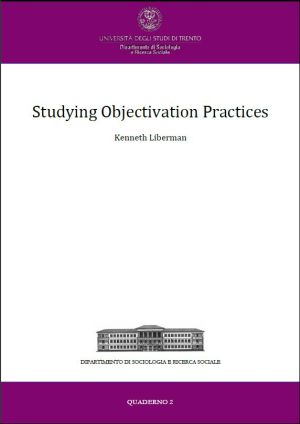Studying Objectivation Practices
Parole chiave:
Ethnomethodology, Intersubjectivity, Objectivation Practices, Artful Practices, Tibetan philosophical debating, Coffee TastingAbstract
Three case studies demonstrate the self-organization of social events: the situated practices of Tibetan philosophical debating, playing table games, and coffee tasting. The paper clarifies the mechanisms by which the self-organization of local affairs emerges and the extent to which local participants to a shared practice can take part in ongoing events. Events mostly drive themselves with their own momentum, but even the event does not know just where it is heading. While local participants are intimately involved, society moves according to its own vectors that exceed the participants’ control. These cases display how actors participate, patterning after each other, how they pick up ways of formulating and ways of knowing that follow from the previous speaker, and how they convert occasioned accounts and formulations into objective forms that can be relied upon by parties for organizing the local orderliness of their affairs.
Riferimenti bibliografici
Lorraine, D. and Galison, R.
Objectivity, NY, Zone Books.
emca-legacy.info 2015. “The Boston Seminars” http://emca-legacy.info/garfinkel.html
Garfinkel, H.
Studies in Ethnomethodology, Englewood Cliffs, New Jersey, Prentice-Hall.
Garfinkel, H.
Ethnomethodology’s Program, Lanham, Md., Rowman & Littlefield.
Garfinkel, H.
Seeing Sociologically: the Routine Grounds of Social Action, Boulder, Colorado, Paradigm Publishers.
Gurwitsch, A.
Studies in Phenomenology and Psychology, Evanston, Ill., Northwestern University Press.
Heritage, J. and Raymond, G.
“The Terms of Agreement: Epistemic Authority and Subordination in Talk-in-Interaction,” in «Social Psychology Quarterly 68 (1)», pp. 15-38.
Heritage, J.
“Epistemics in Conversation,” in The Handbook of Conversation Analysis, edited by Jack Sidnell and Tanya Stivers, Oxford, Blackwell.
Husserl, E.
Formal and Transcendental Logic, The Hague, Martinus Nijhoff.
Husserl, E.
“The Origin of Geometry,” Appendix I in Edmund Husserl, The Crisis of the European Sciences and Transcendental Phenomenology, Evanston, Ill., Northwestern University Press.
Husserl, E.
Experience and Judgment. Evanston, IL, Northwestern University Press.
Husserl, E.
Ideas Pertaining to a Pure Phenomenology, trans. by Fred Kersten, The Hague, Martinus Nijhoff.
Liberman, K.
Dialectical Practice in Tibetan Philosophical Culture, Lanham, Md., Rowman & Littlefield.
Liberman, K.
More Studies in Ethnomethodology, Albany, NY, SUNY Press.
Lynch, M.
“The Ethnomethodological Foundations of Conversation Analysis”, Text, 20 (4), pp. 517-532.
Merleau-Ponty, M.
Phenomenology of Perception, London, Routledge and Kegan-Paul.
Moerman, M. and Sacks H.
“On ‘Understanding’ in the Analysis of Natural Conversation,” in Michael Moerman Talking Culture, Ethnography and Conversation Analysis, Philadelphia, University of Pennsylvania Press, pp. 180-86.
Proust, M.
Finding Time Again. London, Penguin Books.
Psathas, G.
“The Correspondence of Alfred Schutz and Harold Garfinkel,” in H. Nasu, L. Embree, G. Psathas and I. Srubar (eds.), Alfred Schutz and His Intellectual Partners, Konstanz, UVK Verlagsgesselschaft mbH, pp. 401-434.
Schutz, A.
Phenomenology of the Social World. Evanston, Ill., Northwestern University Press.
Schutz, A.
Collected Papers, Vol. I. The Hague, Martinus Nijhoff.
Simmel, G.
Essays on Sociology, Philosophy and Aesthetics, NY, Harper & Row.
Von Lehm, D. and Garfinkel, H.
The Creation and Development of Ethnomethodology, Walnut Creek, CA, Left Coast Press.


